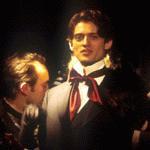SEARCH CurtainUp
On TKTS
LETTERS TO EDITOR
REVIEWS
FEATURES
ADDRESS BOOKS
Broadway
Off-Broadway
DC
NEWS (Etcetera)
BOOKS and CDs
(with Amazon search)
OTHER PLACES
Berkshires
DC (Washington)
London
Los Angeles
QUOTES
FILM
LINKS
MISCELLANEOUS
Free Updates
Masthead
Type too small?
NYC Weather
A CurtainUp Review
The Picture of Dorian Gray
by Les Gutman
|
There is no such thing as a good influence, Mr. Gray. All influence is immoral.... Because to influence a person is to give him one's own soul. ---Lord Henry, Wilde's epigram-spitting soulmate |
 Crispin Freeman (Photo: Carol Rosegg) |
The play focuses on three characters: Basil Hallward (Andrew Seear), an earnest painter, Dorian Gray (Crispin Freeman), his beautiful young subject and Lord Henry Wotton (Daniel Pearce), a self-indulgent, hedonistic disturber of the peace. Floating onstage with them is a narrator, here called Shadow One (Paul Anthony McGrane).
After seeing Basil's completed portrait of him, Dorian is prompted to say, "Why should it keep what I must lose? Every moment that passes takes something from me and gives something to it. Oh, if it were only the other way! If the picture could change, and I could be always what I am now!" It's a wish that will come true. As his innocent heart morphs into an unscrupulous, uncaring one, Dorian remains a beautiful young man, but the portrait becomes ugly. He offers up his soul to remain young, with disastrous effects for a host of people, and ultimately for himself.
O'Byrne's adaptation remains quite faithful to the novel, perhaps to a fault. Wilde's is a playwright's novel, long on dialogue, with enough witty quotes to seed an entire volume of Bartlett's. O'Byrne's effort consists mostly of judicious trimming rather than re-thinking: when the novel shifts to narrative, we hear it recited as narration; where Wilde has supplied dialogue, it is freely claimed. To underscore the story as a Greek tragedy -- it's best thought of as a cautionary parable -- O'Byrne employs a Greek chorus that sometimes joins with its master, McGrane, for recitation (as well as to provide atmospherics, sometimes effectively but just as often divertingly).
One could think of Dorian's wish-that-comes-true as a Faustian bargain, but Lord Henry, his corruptor, is more Falstaff than Mephistopheles. Pearce's rendering is serviceable if not especially alluring. Freeman is believable as the young Narcissus, hampered somewhat by O'Byrne's inability to truly evoke Dorian's rampage of nightcrawling through the seedy underbelly of London. Seear is fine as Basil; ditto for McGrane's Shadow. On film, the portrait itself is essentially a character, a tricky proposition on the stage, not solved deftly here. O'Byrne has used masks to represent the faces of those dozen or so other characters (performed by about half as many actors) for whom the aging process has not been arrested.
To suggest the dimly lit streets of London and its dens of iniquity, Brian Nason lights the stage spottily, at times a choice that is at the audience's expense. The set designers rely on complicated and often clumsy inventions to portray the various scene shifts demanded, with resulting staging that seems pointless (as when actors must circle through the frame of a door to return to the same stage space from which they departed. David Toser's period costumes induce no quibbles.
Bringing this literature to the stage does no violence to it, but as with any play informed by antecedents in both book and film, one must ask whether the instant approach affords any advantages. This production doesn't find any.
|
THE PICTURE OF DORIAN GRAY Adapted for the stage and directed by Joe O'Byrne based on the novel by Oscar Wilde with Paul Vincent Black, Crispin Freeman, Nick Hetherington, Tertia Lynch, Colleen Madden, Paul Anthony McGrane, Daniel Pearce, Angela Pierce, Andrew Seear and Timothy Smallwood Set Design: Akira Yoshimura and Rebecca Vary Costume Design: David Toser Lighting Design: Brian Nason Sound Design: Murmod, Inc. Mask and Puppet Design: Bob Flanagan Running Time: 2 hours and 30 minutes with one intermission Irish Repertory Theatre, 132 West 22nd Street (6/7 Avs.) Telephone (212) 727-2737 www.irishrepertorytheatre.com Tues. - Sat. @8, Sat. - Sun. @3 $35-45 Opening 3/22/01 Closing 5/6/01 -- extended to 5/29! . Reviewed by Les Gutman based on 3/20/01 performance |






